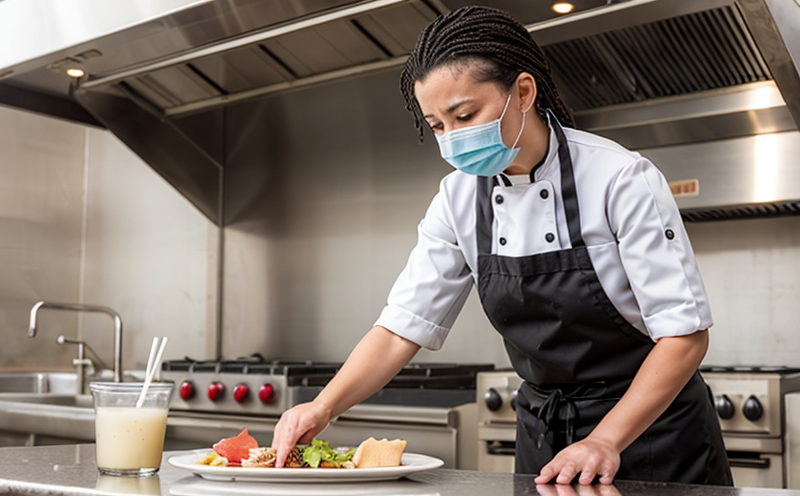
-
Food Safety and Testing-
Food Safety in Hospitality and Foodservice-
The Role of Food Safety in Preventing Restaurant Foodborne Illnesses
We provide comprehensive solutions designed to help our clients mitigate risks, enhance performance, and excel in key areas such as quality, health & safety, environmental sustainability, and social responsibility.
Discover
For many years, our organization has been operating successfully, boasting modern laboratories that meet international standards. These laboratories are equipped with the latest technology devices and equipment, and we have built a strong team of experienced and trained personnel to operate them.
DiscoverWelcome to Eurolab, your partner in pioneering solutions that encompass every facet of life. We are committed to delivering comprehensive Assurance, Testing, Inspection, and Certification services, empowering our global clientele with the ultimate confidence in their products and processes.
Discover
-
Food Safety and Testing-
Food Safety in Hospitality and Foodservice-
The Role of Food Safety in Preventing Restaurant Foodborne IllnessesThe Role of Food Safety in Preventing Restaurant Foodborne Illnesses
Food safety is a critical aspect of the foodservice industry, as it directly impacts the health and well-being of consumers. Restaurants have a responsibility to ensure that their food products are safe for consumption, and any lapses in food safety protocols can lead to serious consequences, including foodborne illnesses. In this article, we will explore the importance of food safety in preventing restaurant foodborne illnesses, highlighting key factors, practices, and regulations that restaurants must adhere to.
Factors Contributing to Foodborne Illnesses
Foodborne illnesses are caused by consuming contaminated or spoiled food products. Restaurants can unknowingly contribute to these illnesses through various means, including:
Employee Training: Restaurants must provide regular training to employees on proper food handling, storage, and preparation techniques.
Cleanliness and Sanitation: Equipment, utensils, and surfaces must be thoroughly cleaned and sanitized after each use.
Temperature Control: Food products must be stored at the correct temperature to prevent spoilage and contamination.
Regulations Governing Food Safety
Restaurants are subject to various regulations governing food safety. These include:
Health Department Inspections: Regular inspections by health departments ensure that restaurants meet minimum food safety standards.
QA Section
Q: What are the most common causes of foodborne illnesses in restaurants?
A: The most common causes of foodborne illnesses in restaurants include inadequate cleaning and sanitation practices, improper food handling and storage, and cross-contamination.
Q: How often should employees wash their hands?
A: Employees should wash their hands frequently, especially before handling food products. This can include washing hands after using the restroom, after smoking or drinking, and before returning to work.
Q: What are some effective ways to prevent cross-contamination in the kitchen?
A: Effective methods for preventing cross-contamination include:

Hospitality and Tourism Certification
Hospitality and Tourism Certification: Unlocking Opportunities in the Industry The hospitality and ...

Energy and Sustainability Standards
In today’s rapidly evolving world, businesses face increasing pressure to meet global energy a...

Food Safety and Testing
Food Safety and Testing: Ensuring the Quality of Our Food As consumers, we expect our food to be sa...

Battery Testing and Safety
Battery Testing and Safety: A Comprehensive Guide As technology continues to advance, battery-power...

Electromechanical Safety Certification
Electromechanical Safety Certification: Ensuring Compliance and Protecting Lives In todays intercon...

IT and Data Center Certification
IT and Data Center Certification: Understanding the Importance and Benefits The field of Informatio...

Pressure Vessels and Installations Testing
Pressure Vessels and Installations Testing Pressure vessels are a critical component of various ind...

Cosmetic Product Testing
The Complex World of Cosmetic Product Testing The cosmetics industry is a multi-billion-dollar ma...

Environmental Simulation Testing
Environmental Simulation Testing: A Comprehensive Guide In todays world, where technology is rapidl...

Fire Safety and Prevention Standards
Fire Safety and Prevention Standards: Protecting Lives and Property Fire safety and prevention stan...

Renewable Energy Testing and Standards
Renewable Energy Testing and Standards: Ensuring a Sustainable Future The world is rapidly transiti...

Automotive Compliance and Certification
Automotive Compliance and Certification: Ensuring Safety and Efficiency The automotive industry is ...

MDR Testing and Compliance
MDR Testing and Compliance: A Comprehensive Guide The Medical Device Regulation (MDR) is a comprehe...

Product and Retail Standards
Product and Retail Standards: Ensuring Quality and Safety for Consumers In todays competitive marke...

Industrial Equipment Certification
Industrial equipment certification is a critical process that ensures industrial equipment meets spe...

Aviation and Aerospace Testing
Aviation and Aerospace Testing: Ensuring Safety and Efficiency The aviation and aerospace industr...

Electrical and Electromagnetic Testing
Electrical and Electromagnetic Testing: A Comprehensive Guide Introduction Electrical and electrom...

Consumer Product Safety
Consumer Product Safety: Protecting Consumers from Harmful Products As a consumer, you have the rig...

NEBS and Telecommunication Standards
Network Equipment Building System (NEBS) and Telecommunication Standards The Network Equipment Bu...

Healthcare and Medical Devices
The Evolution of Healthcare and Medical Devices: Trends, Innovations, and Challenges The healthcare...

Railway Industry Compliance
Railway Industry Compliance: Ensuring Safety and Efficiency The railway industry is a critical comp...

Environmental Impact Assessment
Environmental Impact Assessment: A Comprehensive Guide Environmental Impact Assessment (EIA) is a c...

Trade and Government Regulations
Trade and government regulations play a vital role in shaping the global economy. These regulations ...

Agricultural Equipment Certification
Agricultural equipment certification is a process that ensures agricultural machinery meets specific...

Transportation and Logistics Certification
Transportation and Logistics Certification: A Comprehensive Guide The transportation and logistics ...

Pharmaceutical Compliance
Pharmaceutical compliance refers to the adherence of pharmaceutical companies and organizations to l...

Construction and Engineering Compliance
Construction and Engineering Compliance: Ensuring Safety, Quality, and Regulatory Adherence In the ...

Military Equipment Standards
Military Equipment Standards: Ensuring Effectiveness and Safety The use of military equipment is a ...

Lighting and Optical Device Testing
Lighting and Optical Device Testing: Ensuring Performance and Safety Lighting and optical devices a...

Chemical Safety and Certification
Chemical safety and certification are critical in ensuring the safe management of products and proce...